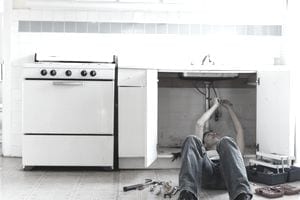
Common Plumbing Signs to Watch Out for: When to Call a Plumber
Plumbing problems can sneak up on you when you least expect them, leading to major headaches and potential damage to your property. Some issues might seem insignificant at first, but they can quickly escalate into serious problems that require immediate attention. Recognizing the early warning signs of plumbing problems and knowing when to call a plumber can save you time, stress, and money. Here are some common signs to watch out for.
1. Slow Draining Sinks
What It Means:
A slow-draining sink might indicate a blockage in the pipes. Over time, hair, soap scum, food particles, and other debris can build up and cause clogs.
When to Call a Plumber:
If the problem persists after trying common household remedies like plungers or liquid drain cleaners, it might be time to call a professional to remove the obstruction.
2. Leaky Faucets
What It Means:
A leaky faucet might seem like a minor nuisance, but it can lead to a surprising waste of water over time. The problem could stem from a worn-out washer or a more complex issue within the tap mechanism.
When to Call a Plumber:
If you’ve tried tightening the faucet or replacing the washer without success, it might be time to call a plumber to fix or replace the entire unit.


3. Low Water Pressure
What It Means:
Low water pressure could indicate several underlying problems, such as corroded pipes, a blocked aerator, or an issue with the municipal water supply.
When to Call a Plumber:
If cleaning the aerator doesn’t resolve the issue, or if the problem affects multiple faucets, a professional plumber can diagnose and fix the problem.
4. Running Toilet
What It Means:
A constantly running toilet can waste gallons of water each day. This problem might be due to a flapper valve that doesn’t seal properly, a misaligned float, or other internal issues.
When to Call a Plumber:
If you’ve attempted to fix the issue by adjusting the float or replacing the flapper without success, calling a plumber would be the next step.
5. Unusual Sounds or Smells
What It Means:
Strange sounds like gurgling or banging, or unpleasant smells emanating from drains or toilets, could indicate serious problems such as blocked vents, damaged pipes, or sewer line issues.
When to Call a Plumber:
Since these symptoms might signal major underlying problems, it’s wise to call a plumber as soon as possible.
6. Water Stains or Damage
What It Means:
Water stains on walls, ceilings, or floors might indicate hidden leaks. These leaks can cause significant damage to your home’s structure if left untreated.
When to Call a Plumber:
If you notice unexplained water stains or damage, contact a plumber immediately to locate and fix the leak.



Your home’s plumbing system is complex, and even seemingly minor issues can lead to significant problems if left unattended. By staying vigilant and recognizing these common signs, you can act promptly and call a plumber when needed. It’s always better to err on the side of caution and consult a professional to ensure your plumbing system stays in optimal condition. Regular inspections and maintenance can also help prevent unexpected surprises and keep your home safe and dry.
DIY Plumbing Fixes: Are They Safe?
When a plumbing problem arises, it’s tempting to reach for the toolbox and attempt to fix it yourself. With a plethora of online tutorials and the desire to save money, many homeowners feel empowered to tackle plumbing repairs on their own. But are DIY plumbing fixes safe? Let’s delve into the potential risks and why it might be best to call a professional instead.
1. Inexperience and Lack of Knowledge:
While some plumbing fixes might seem simple on the surface, they often require specialized knowledge and expertise. An incorrect repair can lead to further damage, escalating costs, and potential health hazards.
2. Risk of Injury:
Plumbing work often involves the use of tools and equipment that can be dangerous if mishandled. A slip with a wrench or incorrect use of a pipe cutter can lead to personal injury.
3. Potential Legal Issues:
Some jurisdictions have specific regulations and codes concerning plumbing work. Attempting DIY repairs without understanding these rules can lead to non-compliance, fines, or even legal action.
4. Compromising Insurance:
Insurance policies may require that plumbing work be performed by licensed professionals. If a DIY repair leads to damage, your insurance might not cover the costs, leaving you financially exposed.
5. Long-Term Consequences:
A seemingly successful DIY fix might mask underlying problems or create new ones, leading to long-term issues that only become apparent later. These delayed problems can be more expensive and difficult to resolve.
6. Lack of Proper Tools and Equipment:
Professional plumbers have access to specialized tools and equipment designed to handle specific tasks. Using makeshift tools or inappropriate techniques can lead to incomplete or faulty repairs.



When to Call a Professional
While it’s understandable to want to handle minor plumbing issues yourself, the potential risks often outweigh the benefits. Simple tasks like unclogging a drain or tightening a loose faucet might be within the realm of DIY, but anything more complex should be left to the professionals.
Plumbers are trained to adhere to safety standards, understand local regulations, and possess the necessary tools to perform repairs correctly. By hiring a professional, you ensure that the job is done right, complies with all relevant laws, and minimizes the risk of future problems.
Remember, a quick call to a professional plumber can save you time, money, and potential headaches in the long run. The peace of mind that comes from knowing your plumbing system is in expert hands is often well worth the investment.
How Much Does It Cost to Hire a Plumber?
Hiring a plumber is often the most practical and safe solution for dealing with plumbing problems. Understanding the average costs for common plumbing fixes can help you budget accordingly. Here are some of the typical services and their associated costs:
- Unclogging Drains: Depending on the severity and location of the clog, this can range from $50 to $200.
- Fixing a Leaky Faucet: Generally, this repair costs between $150 and $350.
- Water Heater Repair or Replacement: This can be a more significant expense, with costs ranging from $300 to $900 for repairs and $800 to $3,000 for replacements.
- Toilet Repair or Replacement: Repairing a toilet might cost between $100 and $200, while replacement ranges from $200 to $750.
- Sewer Line Repair: This is one of the more complex jobs and can cost anywhere from $1,000 to $4,000.
- Pipe Replacement: Depending on the material and extent of the work, pipe replacement can run from $400 to $1,500.
Other Cost Considerations
Keep in mind that these are average costs, and the actual expense may vary based on factors such as:
- Location: Plumbing costs can differ significantly based on where you live.
- Complexity of the Job: More complex jobs may require specialized equipment or extended labor, affecting the final price.
- Time of Service: Emergency calls during nights or weekends might incur additional charges.
- Parts and Materials: The quality and type of materials used will impact the overall cost.
While the thought of plumbing costs might be daunting, professional repairs are usually worth the investment. Attempting to fix plumbing issues yourself may seem cheaper but could lead to more significant problems and expenses in the long run. Knowing the common costs associated with plumbing repairs can help you make an informed decision and ensure the work is done correctly and safely.



Top Plumbing Maintenance Tips to Prevent Future Plumbing Problems
Regular maintenance is crucial for keeping your plumbing system in optimal condition and avoiding unexpected issues. Here’s a collection of essential tasks and tips that can help ensure your plumbing system is well-taken care of:
Regularly Check for Leaks
- Inspect faucets, showerheads, and pipes for any drips or wet spots.
- Check under sinks and around appliances for any signs of moisture or water damage.
- Repair small leaks promptly to prevent them from escalating into bigger problems.
Clean Drains and Use Strainers
- Use drain strainers to prevent hair, soap scum, and other debris from clogging your drains.
- Clean sink and shower drains regularly with appropriate cleaners or a simple mixture of baking soda and vinegar.
- Avoid using harsh chemical drain cleaners that can damage pipes.
Inspect and Maintain Water Heater
- Flush the tank yearly to remove sediment that can reduce efficiency and lifespan.
- Check the pressure relief valve to ensure it’s working correctly.
- Set the thermostat to a reasonable temperature (usually around 120°F) to save energy and prevent scalding.
Be Mindful of What Goes Down the Drain
- Don’t dispose of fats, oils, or grease in the sink, as they can solidify and cause blockages.
- Avoid flushing non-biodegradable items down the toilet, like baby wipes and hygiene products.
Insulate Pipes in Freezing Climates
- Properly insulate exposed pipes to prevent freezing and potential bursting in cold weather.
- Disconnect garden hoses during winter to prevent outdoor faucets from freezing.
Know Where Your Main Shut-Off Valve Is
- Locate and label the main water shut-off valve so you can quickly turn off the water supply in an emergency.
Schedule Professional Inspections
- Regular professional inspections can identify potential issues before they become significant problems.
- Consider setting up an annual plumbing inspection with a licensed plumber to check the entire system.


By adhering to these maintenance tips and important tasks, you can proactively take care of your plumbing system and minimize the likelihood of future problems. Regular attention to your plumbing not only preserves its functionality but can also save you money in the long run by preventing costly repairs or replacements. If ever in doubt about a plumbing issue, don’t hesitate to consult a professional plumber who can provide expert advice and service.
Best Plumbing Companies in 2023
Finding the right plumbing company for your needs can be a challenging task, but knowing the top players in the industry can make your decision much easier. Here are some of the best plumbing companies in 2023, offering outstanding services, reputation, and value:
1. Roto-Rooter
- Services: Full-service plumbing, drain cleaning, and water cleanup.
- Coverage: Nationwide service across the U.S.
- Reputation: Known for prompt response, professional technicians, and 24/7 availability.
2. Benjamin Franklin Plumbing
- Services: Plumbing repairs, installation, maintenance, and emergency services.
- Coverage: Multiple locations in different states.
- Reputation: Punctuality is a key factor; they pay you if they’re late to an appointment.
3. Mr. Rooter Plumbing
- Services: Residential and commercial plumbing services including drains, sewer lines, and more.
- Coverage: Serving all major areas in the U.S. and Canada.
- Reputation: Customer-focused approach with upfront pricing.
4. ARS/Rescue Rooter
- Services: Heating, cooling, and plumbing services.
- Coverage: Locations in several states.
- Reputation: Offers exceptional service and emergency support.
5. American Leak Detection
- Services: Specializing in leak detection and repair.
- Coverage: Nationwide presence.
- Reputation: Known for using non-invasive methods to detect leaks accurately.
6. Mike Diamond Plumbing
- Services: Plumbing, heating, air conditioning, and electrical services.
- Coverage: Serving Southern California.
- Reputation: Famed for “The Smell Good Plumber” promise.



7. PlumbZilla
- Services: General plumbing services with a focus on eco-friendly solutions.
- Coverage: Multiple regions across the country.
- Reputation: Emphasizes green plumbing practices and energy-efficient solutions.
8. BlueFrog Plumbing + Drain
- Services: Residential and commercial plumbing services.
- Coverage: Expanding network across the U.S.
- Reputation: Offers 24/7 service and focuses on customer satisfaction.
The best plumbing companies in 2023 not only offer comprehensive services but also emphasize customer satisfaction, reliability, and quality. Whether you need routine maintenance or emergency plumbing services, these companies have earned a reputation for excellence. Always consider factors such as location, specific services, and customer reviews to choose the right company that aligns with your needs and budget.
The Importance of Finding a Licensed Plumber
When it comes to plumbing work, hiring a licensed plumber is not just a recommendation; it’s a necessity. A licensed plumber has undergone extensive training, passed stringent exams, and adheres to state and local regulations. Here’s why finding a licensed plumber is crucial and how you can verify their credentials.
Why Hire a Licensed Plumber?
- Quality of Work: Licensed plumbers are skilled professionals who have met specific educational and experience requirements. They are equipped to provide quality work that meets building codes and safety standards.
- Legal Compliance: Hiring a licensed plumber ensures compliance with local laws and regulations. Unlicensed work can lead to legal troubles, fines, and may void warranties or insurance coverage.
- Safety: Licensed plumbers are trained to follow proper safety protocols. They can identify and handle potential hazards, reducing the risk of injury or damage to your property.
- Accountability: Licensing offers a measure of accountability. If something goes wrong, you have a formal channel to file complaints and seek resolution.
How to Verify Plumbing Licenses
- Ask Directly: Always ask the plumber for their license number and verify it with the relevant authority.
- Check Online: Many states and localities have online databases where you can search for and verify a plumber’s license.
- Look for Visible Credentials: Licensed plumbers often display their license number on their website, business cards, and work vehicles.
- Contact Local Authorities: If you’re unsure, you can contact your local licensing board or regulatory agency. They can provide information on the plumber’s licensing status.
- Review Customer Feedback: Customer reviews can provide insights into a plumber’s professionalism and adherence to regulations. While not a direct verification method, consistent positive feedback can be a good indicator.



Finding and verifying a licensed plumber is an essential step in ensuring that your plumbing work is performed safely, legally, and to the highest standards. By understanding the importance of hiring a licensed professional and following the guidelines to verify their credentials, you can safeguard your investment and enjoy peace of mind. Always prioritize licensed professionals for any plumbing needs, as this choice aligns with best practices and promotes quality, compliance, and satisfaction.
Common Services Plumbers Offer
Plumbers provide an extensive array of services, covering everything from simple repairs to complex installations. Whether you’re dealing with an annoying drip or planning a full kitchen remodel, professional plumbers have the knowledge and tools to handle various tasks. Here’s an overview of common services you can expect from a plumber and why you might need them.
Repairs and Maintenance
- Leak Detection and Repair: Plumbers can find and fix leaks in pipes, faucets, or fixtures, preventing water waste and potential damage to your property.
- Drain Cleaning: Clogs and slow drains can be a nuisance. Plumbers use specialized equipment to clear blockages and ensure smooth water flow.
- Toilet Repair: From running toilets to leaks or clogs, plumbers can diagnose and fix common toilet issues.
- Water Heater Maintenance: Regular servicing of your water heater can extend its lifespan and efficiency. Plumbers can perform tasks such as flushing the tank or checking for signs of wear.
Installations
- New Plumbing Systems: If you’re building a new home or doing extensive remodeling, plumbers can design and install entire plumbing systems.
- Appliance Installation: Professional installation of appliances like dishwashers, washing machines, and water heaters ensures proper functioning and compliance with warranties.
- Sump Pump Installation: In flood-prone areas, a sump pump can protect your property. Plumbers have the expertise to choose and install the right model for your needs.
Specialized Services
- Gas Line Services: Many plumbers offer gas line installation and repair, a task that requires specific expertise due to the associated risks.
- Sewer Inspection and Repair: Using cameras and other specialized tools, plumbers can inspect sewer lines for damage, blockages, or other issues, and carry out necessary repairs.
- Water Treatment Services: If you’re concerned about water quality, plumbers can install water softeners, filters, or purification systems to provide clean and safe water.
Emergency Services
- 24/7 Emergency Response: Many plumbing problems can’t wait. Emergency plumbers are available around the clock to handle urgent issues, such as burst pipes or sewage backups.
Plumbers offer a diverse range of services to meet the varied needs of homeowners, landlords, and businesses. From routine maintenance to specialized tasks, they possess the knowledge, tools, and experience to handle various plumbing challenges. Understanding the array of services available helps you identify when to call a plumber and ensures that you select the appropriate professional for your particular needs. Whether it’s a minor repair or a significant installation, hiring a reputable plumber guarantees quality work that adheres to safety standards and building codes.



Eco-Friendly Plumbing Solutions: An Emerging Trend
In today’s world, where environmental sustainability is a growing concern, more and more homeowners and businesses are looking for eco-friendly solutions, including in the realm of plumbing. Plumbers are responding to this demand by offering services that not only meet functional needs but also align with green principles. Here’s a closer look at this emerging trend and what it entails.
Water Conservation
- Low-Flow Fixtures: Plumbers can install low-flow toilets, faucets, and showerheads that reduce water usage without compromising performance.
- Rainwater Harvesting Systems: Collecting and using rainwater for non-potable purposes like irrigation or toilet flushing is an innovative way to save on water bills and conserve resources.
- Leak Monitoring: By implementing smart leak detection systems, plumbers can provide continuous monitoring, alerting property owners to even minor leaks that might otherwise go unnoticed.
Energy Efficiency
- High-Efficiency Water Heaters: Modern water heaters, including tankless models, use less energy to heat water, resulting in lower energy bills and a reduced carbon footprint.
- Solar Water Heating Systems: Utilizing solar energy to heat water is an eco-friendly option. Plumbers with specialized training can design and install these systems.
Environmentally Friendly Materials
- Recycled or Sustainable Materials: Plumbers can recommend and use materials made from recycled components or sustainable resources for pipes, fixtures, and other plumbing parts.
- Non-Toxic Solutions: For tasks like drain cleaning, plumbers are increasingly using non-toxic, biodegradable products that won’t harm the environment.
Green Certifications and Standards
- Certified Green Plumbers: Some plumbers undergo special training to become certified in green practices. They can provide guidance on how to make your plumbing system more eco-friendly.
- Compliance with Green Building Codes: In many regions, building codes are evolving to include sustainability requirements. Plumbers are staying up-to-date with these changes to ensure that new installations comply with local regulations.
Eco-friendly plumbing solutions represent a significant shift in the industry, reflecting broader societal trends towards sustainability. Whether you’re interested in conserving water, reducing energy consumption, or using environmentally friendly materials, plumbers are offering innovative services to meet these demands.
By opting for green plumbing solutions, property owners can enjoy the dual benefits of efficiency and environmental stewardship. As these practices become more mainstream, it’s likely that the range of eco-friendly options will continue to expand, providing consumers with even more ways to align their plumbing needs with their environmental values. If you’re considering a plumbing project, consulting with a professional who is well-versed in green plumbing practices could be a wise investment in the future of both your property and the planet.


Leave a Reply